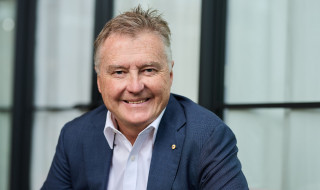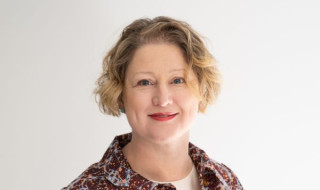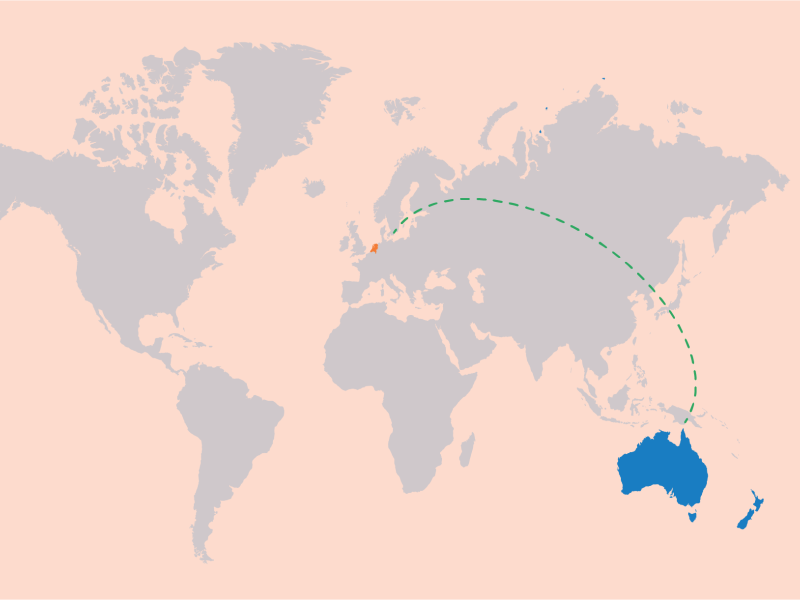How do they do it in Australia and New Zealand?
You can't travel much further than Australia and New Zealand. But even those countries each have their own SURF. How does that work there?
REANNZ has been around for less than 18 years: quite young for an NREN. After all, many of these 'National Research and Education Networks' date back to the late 1980s, when more and more computer networks started connecting universities.
REANNZ focus is on “Connecting Researchers. Everywhere” – a big ask when you think how far New Zealand is from large research centres like Europe. It does this through its eponymous network, international connectivity and services such as eduroam and Tuakiri, the equivalent of SURFconext. "Data and computing services we don't do," says CEO Amber McEwen. "We work closely with another organisation for that."
By contrast, Australia's AARNet is one of the 'old' NRENs. Over the years, its portfolio of tasks has grown. For example, with data storage in the cloud and a security operations centre that also monitors campus networks. As one of few NRENs, AARNet even has its own fibre-optic network to forge all parts of the fifth continent into a digital unity.

Chris Hancock, AARNet
Growing the business
"I am proud of AARNet," says CEO Chris Hancock. "We are big enough to partner with parties like Google and Amazon. And we are often at the forefront of implementing new technologies within Australia."
But Hancock wants more. Ambition number one is "growing the business." He explains: "Our turnover needs to grow by ten per cent this year. Partly through additional business for our security services. But also through support for eResearch."
His other ambition is AARNet5: the new generation of the network. And the expansion of the fibre-optic network beyond Australia.
Challenges
Will all this work? Hancock is cautious: "Covid has dramatically changed the academic landscape. Our members - mainly universities - have scarcer resources than ever before. That is quite a challenge, because there is a huge amount of competition: we have to prove ourselves all the time."
“Our people: have expertise that is scarce in New Zealand. And they will do everything they can to fix issues, even those not directly related to our network.”
"But on the other hand, there have been some major hacks in Australia in the past year, which have also affected ordinary citizens. Everyone is now obsessed with ICT security. And we provide that."
"Of course, there are challenges at the political level as well. But the AARNet model is first and foremost a business model."
Dedication
The latter also seems to apply to REANNZ: if you look at the background of board and staff members, for example, you almost only see careers in business. Amber McEwen herself also joined the NREN last year from the commercial sector.

Amber McEwan, REANZZ
Like Hancock, she sees people as crucial: everything hinges on the right skills. People are a strength of REANNZ, McEwen believes. “Members tell me tremendously good things about our people: they have expertise that is scarce in New Zealand and they will do everything they can to fix issues, even those not directly related to our network. That dedication is really what sets REANNZ apart from the commercial network companies."
To ensure that staff can pay enough attention to members, REANNZ is trying to automate its own business processes as much as possible. For example, through a modern 'digital experience' when ordering services.
Vital importance
A few years ago, all this commitment was not enough for a trio of universities. McEwen: "They didn't think we were value for money."
"Having an NREN is a matter of sovereignty."
But that didn't last long. "The first thing that happened was that the other institutions got together and intervened: the three had to come back, because New Zealand needed an NREN. And then we got support from the GREN: the global club of NRENs. Particularly from Australia."
Hancock: "True: the three universities in fact wanted eduroam via AARNet. I told them to go to REANNZ for that."
And the GREN did more, he continues. "We also wanted to make it clear to the New Zealand government of the day that they needed their own NREN. So we presented them with case studies and showed them what AARNet is doing in Australia for research and education."
"So we have come out stronger."
"And we ran all kinds of network tests, including internationally, that were not possible with commercial providers. So that the government realised that owning an NREN is a matter of sovereignty for New Zealand: a vital interest for the future."
Expanding
That approach worked. So well, in fact, that REANNZ has now received additional funding to renew its network. McEwen, satisfied: "So we have come out stronger."
Instead of downsizing, she wants to expand. First, in terms of the membership within the New Zealand research and education sector. And secondly in terms of impact, because not all institutions have introduced services like eduroam yet. So there is still work to be done to optimise use of the network.
Security
McEwen's third action point is security. "Our members are asking us to help protect their environments by ‘stopping malicious traffic’ from hitting their firewalls. So we are looking at how best to do this without limiting collaboration."
There, too, the AARNet connection is indispensable. Hancock is all for it: "By working closely together, we help Amber's customers at the same time as our own. That's how we can add value as NRENs."
“What other industry do you know where CEOs get around the table to share the secrets of their strategic planning?”
One of REANNZ's main users found out the hard way how important international cooperation is for security. This institution regularly sends large amounts of data to an institution in the UK, but found that its UK partners were becoming increasingly hesitant. McEwen: "We hope to solve that problem together with AARNet and JISC."
No competition
So the conversation keeps turning to collaboration between NRENs: regionally but also globally. For McEwen, it feels like there is a global GREN team behind her people. "This allows us to bring in additional expertise. People from AARNet or JISC come here to show what's possible."
For Hancock, the GREN is a tool for working more effectively and efficiently. "Just think about eduroam. Or FileSender, where SURF was one of AARNet's development partners."
McEwen: "That's possible because we're not competitors, right? That's the beauty of it."
Hancock: "Exactly. What other industry do you know where CEOs get around the table to share the secrets of their strategic planning? We should use that unique advantage well.”
Text: Aad van de Wijngaart
'Hoe doen ze het in Australië en Nieuw-Zeeland?' is een artikel van SURF Magazine. 5x per jaar het magazine in je inbox? Abonneer je dan op SURF Magazine via onderstaand formulier.
Vragen naar aanleiding van dit artikel? Mail naar magazine@surf.nl.
